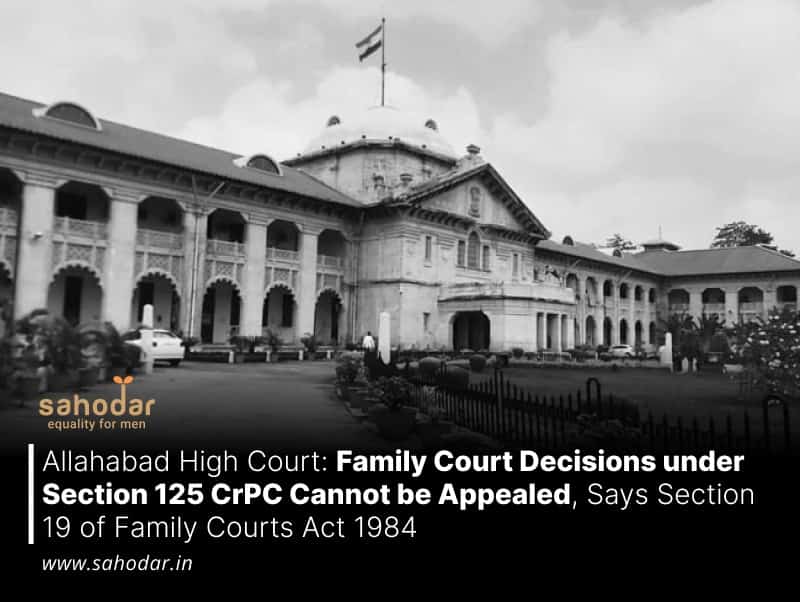The Allahabad High Court has clarified that if a Family Court issues a decision under Section 125 of the Code of Criminal Procedure, 1973, you can’t appeal it to the High Court. This is based on Section 19 of the Family Courts Act, 1984. This decision was explained by a panel led by Justice Saumitra Dayal Singh and Justice Shiv Shanker Prasad while considering Section 19 of the Family Courts Act, 1984.
“By using the words “Save as provided in sub-section (2)”, the parliament has left no doubt to be entertained as to the supremacy of sub-section (2) of Section 19 with respect to right of appeal created under Section 19(1) of the Act. Section 19(2) of the Act clearly denies right of appeal against any order that may be passed by a Family Court under Chapter IX of the Cr.P.C. Undisputedly Section 125 Cr.P.C. is an integral part of Chapter IX of the Cr.P.C.”
The appellant previously lodged a criminal revision before the High Court to contest the adjudication of the Additional Principal Judge at the Family Court in Shahjahanpur. The impugned decision, rendered under Chapter IX, Section 125 of the Code of Criminal Procedure, 1973, awarded the respondent-wife a monthly maintenance of Rs. 2500 from the inception of her application. The appellant subsequently withdrew the criminal revision with the liberty to seek redress from the appropriate judicial forum, resulting in a delay of 468 days in initiating the primary appeal before the High Court.
Counsel for the appellant asserted that each decree issued by the Family Court was subject to appeal before the High Court pursuant to Section 19 of the Family Courts Act, 1984.
In consonance with Section 19(1) of the Family Courts Act, 1984, an avenue for appeal to the High Court is provided for every order or judgment of the Family Court, excluding interlocutory orders. However, Section 19(2) delineates specific conditions concerning…
“No appeal shall lie from a decree or order passed by the Family Court with the consent of the parties [or from an order passed under Chapter IX of the Code of Criminal Procedure, 1973 (2 of 1974)”
The Court observed that the appeal is arising from order passed by the Family Court under Section 125 CrPC. and not under Section 24 of the Hindu Marriage Act, 1955.
“While, it is true that every judgment or order passed by a Family Court is appealable to the High Court both on facts and law, except interlocutory orders and though it may be expected that order providing for maintenance is of the nature that may be appealable, at the same time, the right of appeal granted under Section 19(1) of the Act is hedged,” observed the Court.
The court pronounced that the entitlement to appeal is contingent upon the stipulations set forth in Section 19(2) of the Family Courts Act of 1984. The qualifying phrase “Save as provided” within subsection (2) holds precedence over the appeal entitlement articulated in Section 19(1). The court elucidated that in light of Section 125 of the Code of Criminal Procedure (CrPC) being an integral constituent of Chapter IX of CrPC, the proscription established under Section 19(2) is applicable to adjudications rendered pursuant to Section 125 of CrPC.
Consequently, the appeal contesting the pronouncement of the Family Court under Section 125 of CrPC was adjudicated as devoid of merit and accordingly dismissed.

